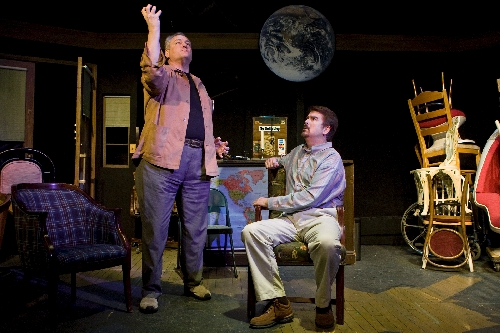‘Lonely Planet’ features whimsy, drama and lots of symbolic chairs

"Know your lines and don’t bump into the furniture."
— Spencer Tracy
Someone blow up a furniture joint?
Secondhand store? Third-rate stuff?
Every chintzy chair in Vegas landed here:
Stiffbacked, overstuffed, rolling, stationary, regal, wobbly, plain white, ugly green, patterned, chipped wood, dull metal, thorny wicker, one apparently out of the Addams Family mansion, another fit for the bridge of the Starship Enterprise and some striped monstrosity, likely from the living room of someone’s grandmother.
"We’ve got almost as many onstage as we do in the audience," says director Walter Niejadlik, marveling at the stockpile of seats at Las Vegas Little Theatre’s tight-quartered Black Box, where "Lonely Planet," opening this weekend, makes symbolic use of each one.
"We have over 40. They’ll be coming in from the front door, through the double doors onstage, some will be suspended and back behind the scrim as well."
Why the Chair Fair? That’s a central conceit in playwright Steven Dietz’s two-man piece, an intriguing entry in the canon of AIDS plays that never utters the word and treats the subject with both drama and humor.
"If you keep hitting somebody over the head with something, after a while they say, ‘Ow,’ " says co-star Brian Scott. "This is taking the roundabout approach, a fresh way."
Employing elliptical storytelling and metaphor, "Lonely Planet" explores the friendship (but not romance) of two gay men, introverted map-store owner Jody (Troy Tinker) and extroverted pal Carl (Scott).
A motormouthed whirlwind, Carl is constantly dropping in with wild stories and upbeat banter, engaging Jody in silly games — including a daffy sword fight with rolled-up maps. "On the surface it’s fun, but there’s a lot of depth to both these characters," Tinker says. "And the way it’s written, it’s a nice blending of naturalism and theater of the absurd. It borrows from both worlds."
Eventually, it becomes obvious that Carl is a lifeline from the outside world to Jody, who, we learn, doesn’t leave his little store, where the fixed boundaries and geography of his maps lend him a sort of psychological defense against a random, ravaging plague just outside his door.
"It is absurd at points," Niejadlik says, "then it punches you in the gut when you see this dark undercurrent," and that emerges as Jody is increasingly unnerved by Carl, who baffles Jody by describing imaginary jobs while carrying more and more chairs into the shop.
"The audience figures out what’s going on fairly soon into it," Tinker says, and, in fact, it becomes clear that both the occupations and the furniture belonged to dead friends. Chairs pile up around Jody as his shop becomes a grim obstacle course — a metaphorical stand-in for the horror he’s desperately tried to evade — as Carl attempts to pull him into dealing with a devastating reality.
"The author, Steven Dietz, referred to this as an homage to friendship," Scott says. "What are you willing to do for your friend? What would you do to help your friend?"
Weary at the pure volume of funerals he’s attended, Carl tells Jody: "It’s gotten to the point where I go just to see who’s alive."
Though peppered with such stark dialogue, "Lonely Planet" is more subtle in its handling of AIDS politics and polemics, which were spelled out with more emphasis in acclaimed dramas such as "Angels in America" and "The Normal Heart."
Debuting in the early ’90s, Dietz’s offbeat commentary was written before the wide availability of antiviral drugs.
Wrote Ben Brantley in The New York Times: "Told in gently mannered, game-playing dialogue and stocked with rigorously symbolic images, ‘Lonely Planet’ is rather like a bedtime story that deals with a child’s fears by presenting them in an airy fable. Just how you respond will depend on your tolerance for this particular approach to dark subjects."
Dodging the multiplying furniture is a staging challenge, as the actors have to step around the crowded, compact stage by the climax, though Tinker credits it with helping him portray his character’s emotional dilemma.
"It gives you something to play off of, that feeling of imprisonment by these chairs, and the imprisonment by the deaths of the people you call friends," he says. "The claustrophobia of not being able to live your life because of this."
Adds Scott: "I don’t think I will ever look at a chair the same way again, especially what they stand for."
They know their lines.
Metaphorically speaking, though, the entire point is to bump into the furniture.
Contact reporter Steve Bornfeld at sbornfeld@ reviewjournal.com or 702-383-0256.
Preview"Lonely Planet"
8 p.m. today, Saturday and Thursday; 2 p.m. Sunday (through Feb. 6)
Las Vegas Little Theatre Black Box, 3920 Schiff Drive
$14-$15 (362-7996; www.lvlt.org)












